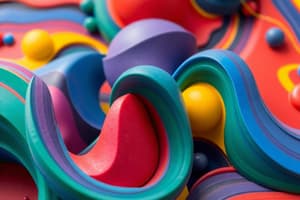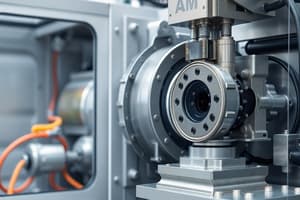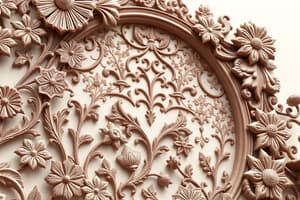Podcast
Questions and Answers
What does AM stand for?
What does AM stand for?
Additive Manufacturing
What is the main advantage of using AM?
What is the main advantage of using AM?
It creates anything you want
What does the acronym STL stand for?
What does the acronym STL stand for?
Stereolithography
What are two of the most important requirements for AM?
What are two of the most important requirements for AM?
What are the two most important aspects of AM?
What are the two most important aspects of AM?
AM is a subtractive manufacturing process, meaning material is removed to create the final object.
AM is a subtractive manufacturing process, meaning material is removed to create the final object.
Which of these is NOT a synonymous term for AM?
Which of these is NOT a synonymous term for AM?
AM has been around for a long time, but it's only recently become more popular.
AM has been around for a long time, but it's only recently become more popular.
What is the main benefit of using AM?
What is the main benefit of using AM?
What is the most important factor for selecting materials for AM?
What is the most important factor for selecting materials for AM?
What is the most important aspect of AM when it comes to sustainability?
What is the most important aspect of AM when it comes to sustainability?
The use of digital data is essential for AM processes.
The use of digital data is essential for AM processes.
What is the name of the widely accepted file format for 3D models in AM?
What is the name of the widely accepted file format for 3D models in AM?
AM is only used to create prototypes.
AM is only used to create prototypes.
What are two of the key benefits of AM?
What are two of the key benefits of AM?
What is the main difference between Additive Manufacturing and traditional subtractive manufacturing?
What is the main difference between Additive Manufacturing and traditional subtractive manufacturing?
High temperatures are always required for AM processes.
High temperatures are always required for AM processes.
AM is always more expensive than traditional manufacturing methods.
AM is always more expensive than traditional manufacturing methods.
What is the term used for a 3D pixel?
What is the term used for a 3D pixel?
AM technology requires the use of molds.
AM technology requires the use of molds.
AM processes can be very fast when it comes to creating parts.
AM processes can be very fast when it comes to creating parts.
What is the term used to describe the process of reducing the material to the desired shape without changing its composition?
What is the term used to describe the process of reducing the material to the desired shape without changing its composition?
AM is becoming more popular due to its potential for creating complex geometries and functionality.
AM is becoming more popular due to its potential for creating complex geometries and functionality.
What is the key benefit that Fused Deposition Modeling (FDM) offers?
What is the key benefit that Fused Deposition Modeling (FDM) offers?
What are the two most common types of extrusion-based AM technologies?
What are the two most common types of extrusion-based AM technologies?
FDM technology requires a lot of post-processing to achieve the desired properties.
FDM technology requires a lot of post-processing to achieve the desired properties.
FDM is well-suited for producing parts with high strength and durability.
FDM is well-suited for producing parts with high strength and durability.
FDM is a good choice for mass production.
FDM is a good choice for mass production.
What are two common defects that can occur in FDM parts?
What are two common defects that can occur in FDM parts?
The use of a binder is essential for binder jetting processes.
The use of a binder is essential for binder jetting processes.
Binder jetting is limited to prototyping.
Binder jetting is limited to prototyping.
Binder jetting is a relatively inexpensive AM process.
Binder jetting is a relatively inexpensive AM process.
Binder jetting requires high temperatures to bond powder particles together.
Binder jetting requires high temperatures to bond powder particles together.
Binder jetting processes can be used to produce parts with a wide range of materials.
Binder jetting processes can be used to produce parts with a wide range of materials.
Binder jetting is a highly efficient process.
Binder jetting is a highly efficient process.
Binder jetting is a complex process.
Binder jetting is a complex process.
Binder jetting is a good choice for producing large-scale parts.
Binder jetting is a good choice for producing large-scale parts.
Binder jetting is a relatively new AM process.
Binder jetting is a relatively new AM process.
Binder jetting is a good choice for producing parts with high accuracy.
Binder jetting is a good choice for producing parts with high accuracy.
Binder jetting is a good choice for producing parts with a smooth surface finish.
Binder jetting is a good choice for producing parts with a smooth surface finish.
Binder jetting is a good choice for producing parts with a wide range of colors.
Binder jetting is a good choice for producing parts with a wide range of colors.
Binder jetting is a good choice for producing parts with high strength.
Binder jetting is a good choice for producing parts with high strength.
Binder jetting is a good choice for producing parts with high detail.
Binder jetting is a good choice for producing parts with high detail.
Binder jetting is a good choice for producing parts with high dimensional accuracy.
Binder jetting is a good choice for producing parts with high dimensional accuracy.
Binder jetting is considered a relatively new technology.
Binder jetting is considered a relatively new technology.
Binder jetting is a good choice for producing parts with excellent surface finish.
Binder jetting is a good choice for producing parts with excellent surface finish.
Binder jetting is a good choice for producing parts with high detail and intricate geometries.
Binder jetting is a good choice for producing parts with high detail and intricate geometries.
Flashcards
Additive Manufacturing (AM)
Additive Manufacturing (AM)
A process that builds objects layer by layer by adding material, typically from a 3D model, as opposed to subtractive manufacturing, which removes material.
Design for AM
Design for AM
Designing specifically for AM processes, taking advantage of its capabilities like complexity and tailored geometries, to create objects that might not be possible with traditional methods.
Rapid Prototyping
Rapid Prototyping
Quickly creating physical models or prototypes of designs, often using AM, for testing and evaluation.
Freeform Fabrication
Freeform Fabrication
Signup and view all the flashcards
Circular Economy
Circular Economy
Signup and view all the flashcards
Post-Processing
Post-Processing
Signup and view all the flashcards
Digital Twin
Digital Twin
Signup and view all the flashcards
CAD (Computer-Aided Design)
CAD (Computer-Aided Design)
Signup and view all the flashcards
STL File
STL File
Signup and view all the flashcards
Voxel
Voxel
Signup and view all the flashcards
Stereolithography (SLA)
Stereolithography (SLA)
Signup and view all the flashcards
Photopolymer
Photopolymer
Signup and view all the flashcards
DLP (Digital Light Processing)
DLP (Digital Light Processing)
Signup and view all the flashcards
Powder Bed Fusion (PBF)
Powder Bed Fusion (PBF)
Signup and view all the flashcards
SLS (Selective Laser Sintering)
SLS (Selective Laser Sintering)
Signup and view all the flashcards
SLM (Selective Laser Melting)
SLM (Selective Laser Melting)
Signup and view all the flashcards
EBM (Electron Beam Melting)
EBM (Electron Beam Melting)
Signup and view all the flashcards
Sintering
Sintering
Signup and view all the flashcards
Binder Jetting
Binder Jetting
Signup and view all the flashcards
FDM (Fused Deposition Modeling) / FFF (Fused Filament Fabrication)
FDM (Fused Deposition Modeling) / FFF (Fused Filament Fabrication)
Signup and view all the flashcards
LOM (Laminated Object Manufacturing)
LOM (Laminated Object Manufacturing)
Signup and view all the flashcards
Volumetric Energy Density
Volumetric Energy Density
Signup and view all the flashcards
Linear Energy Density
Linear Energy Density
Signup and view all the flashcards
Melt Pool
Melt Pool
Signup and view all the flashcards
Balling
Balling
Signup and view all the flashcards
Sputtering
Sputtering
Signup and view all the flashcards
Functional Graded Material
Functional Graded Material
Signup and view all the flashcards
LCA (Life Cycle Assessment)
LCA (Life Cycle Assessment)
Signup and view all the flashcards
Disruptive Technology
Disruptive Technology
Signup and view all the flashcards
Mass Customization
Mass Customization
Signup and view all the flashcards
On-Demand Manufacturing
On-Demand Manufacturing
Signup and view all the flashcards
Decentralized Manufacturing
Decentralized Manufacturing
Signup and view all the flashcards
Intellectual Property Issues
Intellectual Property Issues
Signup and view all the flashcards
Material Properties
Material Properties
Signup and view all the flashcards
Study Notes
Additive Manufacturing Technologies
- Additive manufacturing (AM) processes create objects layer by layer, unlike traditional subtractive manufacturing methods that remove material
- AM technologies are diverse, using various materials, energy sources and processes
- Different classifications exist based on raw material type, process type or basic technology
- Key aspects include materials used in the process, whether liquid, powder or solid sheet, and the process itself
Classes of AM Technologies
- Vat photopolymerization (SLA, DLP, CLIP) uses a liquid photocurable resin, cured by UV light.
- Sheet lamination uses sheets of material, cut and bonded to create the object.
- Powder bed fusion (SLS, SLM, DMLS, EBM) uses a powder bed fused together by laser or electron beam.
- Material extrusion (FDM, FFF, Robocasting, Bioprinting, Contour crafting) extrudes a molten or semi-molten material into layers.
- Binder jetting (3DP, MJP) selectively deposits a liquid binder to bond powder materials.
- Direct energy deposition (LENS, EBAM, LMD) uses a focused thermal energy source to melt and deposit material.
- Material jetting (PolyJet) uses droplets of material selectively deposited.
Key Considerations
- Material properties and characteristics are crucial for AM
- AM is becoming more common and is a rapidly evolving technology
- Speed, cost, and scalability vary between AM processes.
- AM design often emphasizes functional and geometric complexity
- Waste reduction is commonly considered in AM design
- Post-processing steps are often necessary for enhanced part quality, properties, and aesthetics.
Studying That Suits You
Use AI to generate personalized quizzes and flashcards to suit your learning preferences.




